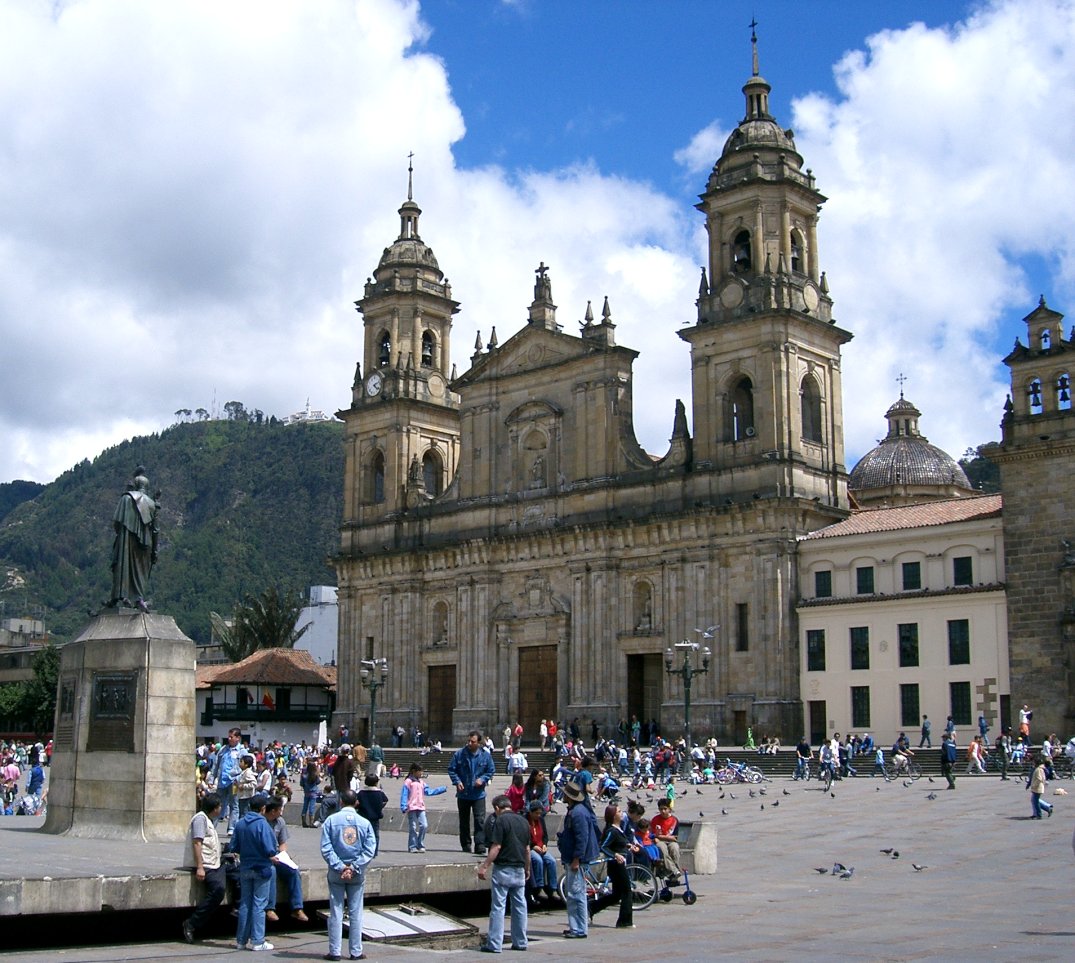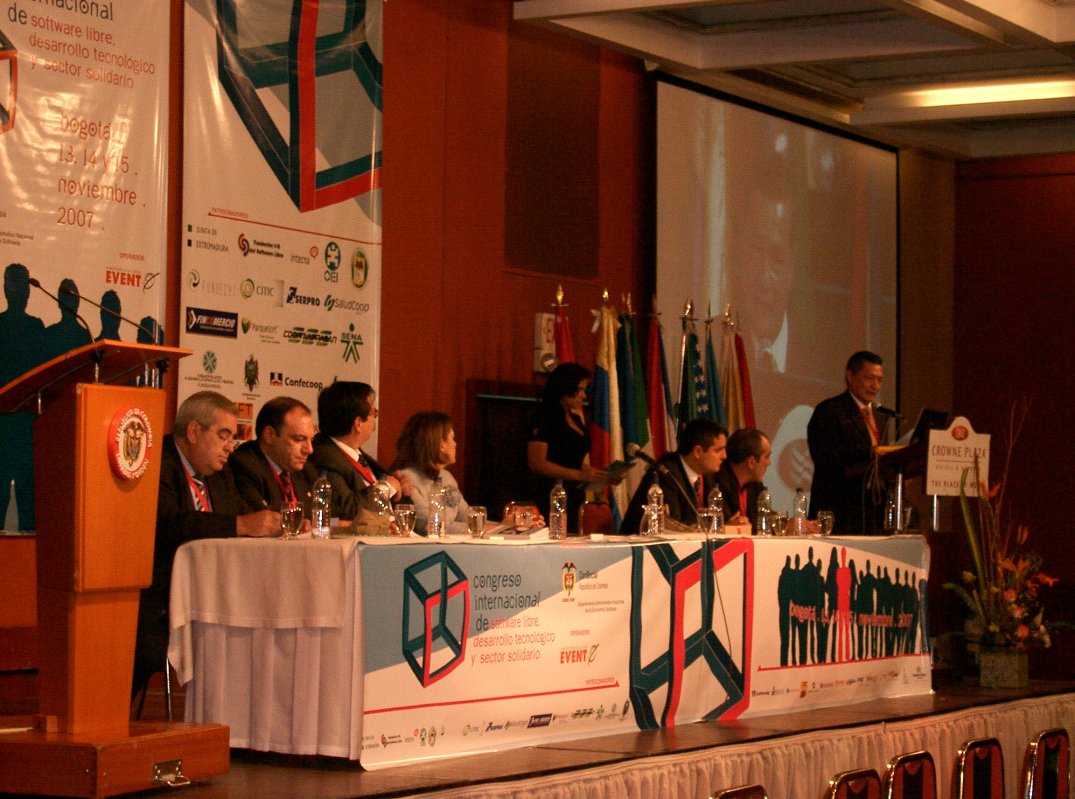The first International Conference on Free Software, Technological Literacy and Solidarity Economy took place in Bogotá (Colombia) from 13th to 15th of November. More than 80 speakers and 600 assistants attended at the the Tequendama Hotel, a traditional meeting point in the city.
Bogotá, a city in the clouds
I’ve lived in Amsterdam for more than a year; in Amsterdam life takes place either a few metres above or a few meters below sea level. So getting used to Bogotá, at an altitude of 2.640 metres, takes a couple of days.

Even talking for more than a minute can leave you breathless, something you’d prefer not to happen in the middle of your talk. Fortunately we landed on Sunday and the conference started until Tuesday morning, which gave most of us time to get used to the general lack of oxygen.
Getting used to an altitude of 2.640 metres takes a couple of days
The conference
The organiser and main promoter of the conference was the Colombian government through DanSocial, a department that was recently created to promote solidarity economy. The Spanish region of Extremadura, known for its commitment to free software in many areas, also played an important role both in the organisation of the event and in the programme.
The opening session attended by around 400 was held in the main room of the hotel. High profile speakers of the opening session were the Colombian president, Álvaro Uribe Vélez, and the Extremenian ex-president Juan Carlos Rodríguez Ibarra. Unfortunately neither of them could attend, and this did reduce the political impact of the event. However, both Colombian and Extremenian institutions were well represented: María del Rosario Guerra, Minister of Communications of Colombia, and Rosemberg Pabón Pabón, Director of DanSocial, hosted the session. The director of the Extremenian Foundation for the Development of Science and Technology, Luis Millán Vázquez de Miguel, and Carlos Castro, General Director of the Department of Telecommunications of Extremadura presented the experience of their project: ongoing work over the last 10 years to guarantee universal access to information society in their region, where free software has played a central role.
The first morning saw heated debate between the panel and the audience, specially after the Communications Minister defended software patents as a way of helping young entrepreneurs get financial support for their projects. Some speakers from the floor demanded better access infrastructure for rural areas, and a majority demanded stronger commitment from the government.

An enriching blend
In the three days that followed, talks and panels were divided into three themes: free software, technological development and solidarity sector. Over 60 sessions covered topics ranging from models for social and cooperative banking, voice over IP, cooperative production of goods and success stories about free software in education institutions.
Speakers and attendees ranged from students, small entrepreneurs to civil servants. Public companies, traditional companies like banks or insurances and new clusters of technological SMEs were also represented. Interaction was easy and constructive, discussion very frequent. In the audience the technically oriented were a majority, but for some it was their first contact with free software. Many others are active supporters, part of a growing community that is active in organising workshops, install parties and support sessions.
Highlights
The conference had many exciting moments, which your reporter tried no to miss. On the first day we could attend the meeting of the Latin American Network for Technological Cooperation and Free Knowledge, created in Badajoz (Spain) in 1995. The network is coordinated by Extremadura, and the new agreement reached in Bogotá was signed by civil and/or governmental organisations from Uruguay, Brazil, Mexico, Colombia, Argentina, Venezuela and Puerto Rico. In this agreement the members reiterate their intention of sharing knowledge, information and experiences in the areas of information and communication technologies, and specially free software.
The link of technological and social topics was very visible
The program for the second day promised many interesting talks, and they did not disappoint. A panel of technological parks was followed by a series of talks on digital television and new emission formats. The link of technological and social topics was very visible here, as it was shown how open formats and free—as in freedom—edition and production tools make possible the existence of cooperative television channels maintained with very scarce resources. In the afternoon, one of the most entertaining presentations took us on a tour of gnuLinEx, the Extremenian Debian-based distro, with the bonus of a hotel-made anti-patent video (in Spanish).
The last day had a short intense program, starting with an insightful session on the actual and potential uses of ICT in health care, and the importance of using open technologies when dealing with such sensitive matters. Before the end, the unfortunate absence of the Cuban Minister of Computing led to your reporter giving his presentation the SELF Project in the main conference room.
Endings are beginnings
The conference close was an emotional ceremony with the presence of the main participants and most of the conference participants. Thanks and congratulations were given, and the air was full with a general feeling of a big something that stretches and slowly starts to move.
Besides the good intentions and the promises for the future, the conference had many practical results. The Declaration of Bogotá was signed by the members of the Latin American Network for Technological Cooperation and Free Knowledge, with concrete actions for the near future in many areas including e-government, digital literacy, education and health care, and future meetings possible in Uruguay and Cuba in the following months. On a smaller scale, most of the assistants made good contacts -at least your reporter did--and shared a great time with interesting people from around the world.